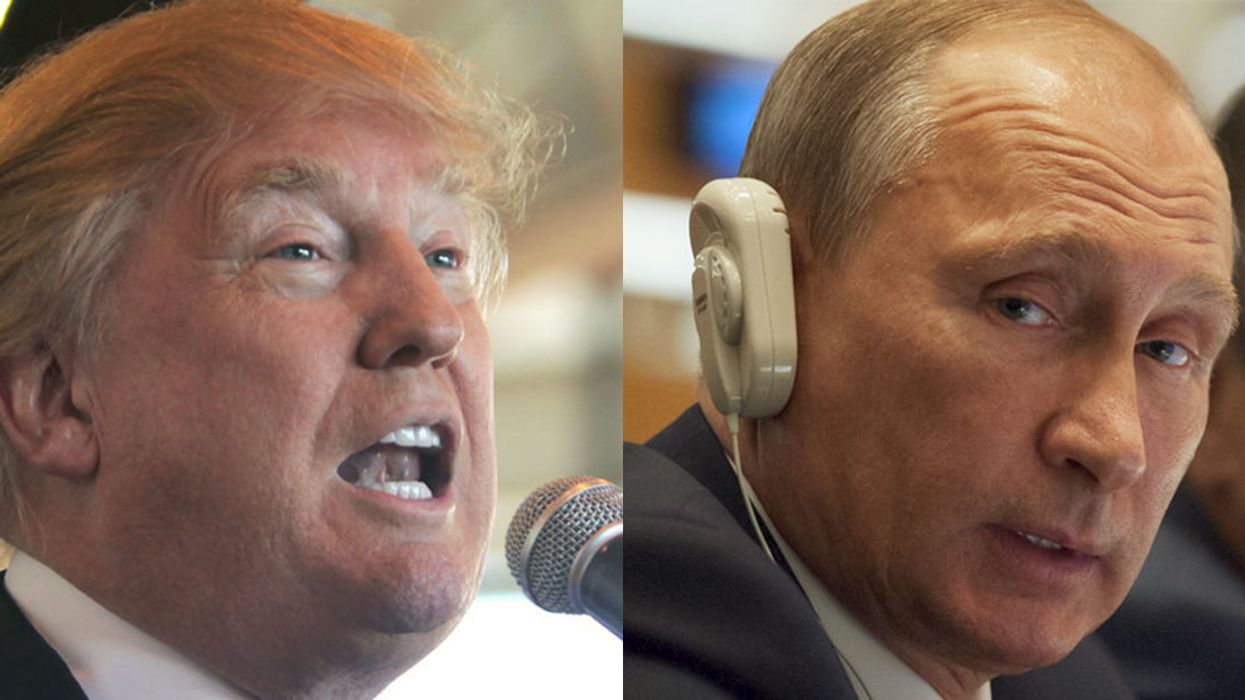Watergate Sleuth Investigates Trump’s Troubling Calls With Putin, Erdogan

President Trump and Russian President Vladimir Putin
Reprinted with permission from Alternet
A new blockbuster CNN report from famed Watergate reporter Carl Bernstein published Monday documented his extensive findings about President Donald Trump's disturbing conversations with foreign leaders.
Though the nature of Trump's interactions with many foreign leaders has been explored before — his call with Ukrainian President Volodymyr Zelensky led to his impeachment — Bernstein's reporting expands the scope of past reporting and fills in new details.
It also reveals that an apparently wide circle of Trump's aides has been and remains deeply troubled by Trump's conduct in international relations. These worries, presumably, are what prompted officials to speak anonymously to Bernstein about what they've seen and heard.
Here are seven details from the report:
1. "[The] calls helped convince some senior US officials — including his former secretaries of state and defense, two national security advisers and his longest-serving chief of staff — that the President himself posed a danger to the national security of the United States."
This is the main takeaway from the piece. Of course, many outside critics of the administration have argued — even long before Trump was elected — that the president's character poses a unique danger in the Oval Office.
Bernstein also found that many former top officials concluded Trump was "delusional" based on the way he talks to foreign leaders.
On the other hand, much of Trump's public behavior also indicates that he's deeply delusional.
2. Trump was consistently deferential to Putin
Unsurprisingly, the report found that Trump shows extreme deference to Russian President Vladimir Putin. Again, this is another detail that confirms Trump acts privately as he does in public. This is, nevertheless, an important and revealing finding, since it shows that Trump's public persona is not a mere act and that there's no clever scheme going on behind the scenes. It's also particularly relevant now, as questioned have emerged about Trump's knowledge of and response to reports of a Russian government plot to place bounties on the heads of American soldiers.
The report explained:
In numerous calls with Putin that were described to CNN, Trump left top national security aides and his chiefs of staff flabbergasted, less because of specific concessions he made than because of his manner — inordinately solicitous of Putin's admiration and seemingly seeking his approval — while usually ignoring substantive policy expertise and important matters on the standing bilateral agenda, including human rights; and an arms control agreement, which never got dealt with in a way that advanced shared Russian and American goals that both Putin and Trump professed to favor, CNN's sources said.
3. Trump spoke most with Erdogan
While Trump's relationship with Putin has drawn most attention during his presidency, Bernstein refocuses some of that scrutiny toward the president's relations with Turkish President Recep Tayyip Erdogan. He found that Trump is apparently absurdly accommodative of Erdogan, sometimes taking his calls "at least twice a week":
According to one high-level source, there are also existing summaries and conversation-readouts of the President's discussions with Erdogan that might reinforce Bolton's allegations against Trump in the so-called "Halkbank case," involving a major Turkish bank with suspected ties to Erdogan and his family. That source said the matter was raised in more than one telephone conversation between Erdogan and Trump.
4. "[If] members of Congress heard from witnesses to the actual conversations or read the texts and contemporaneous notes, even many senior Republican members would no longer be able to retain confidence in the President."
This passage drew swift criticism of Twitter, with many observers pointing out that there seems to be nothing that could dissuade Republican lawmakers from supporting Trump. Maybe so. But the fact that such a claim would be made speaks to the seriousness of the behavior in question. The report also found:
Elements of that testimony by [Fiona] Hill, if re-examined by Congressional investigators, might provide a detailed road-map of the President's extensively-documented conversations, the sources said. White House and intelligence officials familiar with the voice-generated transcriptions and underlying documents agreed that their contents could be devastating to the President's standing with members of the Congress of both parties — and the public — if revealed in great detail. (There is little doubt that Trump would invoke executive privilege to keep the conversations private. However, some former officials with detailed knowledge of many of the conversations might be willing to testify about them, sources said.)
5. Trump "regularly bullied and demeaned the leaders of America's principal allies, especially two women: telling Prime Minister Theresa May of the United Kingdom she was weak and lacked courage; and telling German Chancellor Angela Merkel that she was "stupid."
Trump is well-known to be a misogynist, and he seems to boil with antipathy for American allies. The report explained:
But his most vicious attacks, said the sources, were aimed at women heads of state. In conversations with both May and Merkel, the President demeaned and denigrated them in diatribes described as "near-sadistic" by one of the sources and confirmed by others. "Some of the things he said to Angela Merkel are just unbelievable: he called her 'stupid,' and accused her of being in the pocket of the Russians … He's toughest [in the phone calls] with those he looks at as weaklings and weakest with the ones he ought to be tough with."
6. Trump's lack of knowledge puts him at a disadvantage.
The report said that those around Trump believed he was unable to learn or grow in his interactions with foreign leaders. And his wide-ranging ignorance could be used against him:
Two sources described the President as woefully uninformed about the history of the Syrian conflict and the Middle East generally, and said he was often caught off guard, and lacked sufficient knowledge to engage on equal terms in nuanced policy discussion with Erdogan. "Erdogan took him to the cleaners," said one of the sources.
7. Trump acted in his own self-interest, rather than the national interest
This was the central charge in the impeachment case against Trump: he's unable or unwilling to differentiate between the national interest and his own personal interest.
This has always been a clear defect in Trump's character; it's patently obvious in the way he speaks publicly. Behind the scenes, it seems, he's no different. The CNN piece concluded:
"There was no sense of 'Team America' in the conversations," or of the United States as an historic force with certain democratic principles and leadership of the free world, said the official. "The opposite. It was like the United States had disappeared. It was always 'Just me'."
- Trump And Russia: Is It Watergate Yet? - National Memo ›
- Excerpt: 'Republic Of Spin: An Inside History Of The American ... ›
- Danziger Draws - National Memo ›








